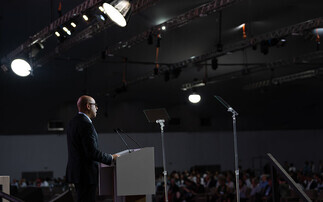Open letter signed by 10 food industry executives including Mars and Kellogg's also pledges to step up corporate action
Chief executives from a host of global food companies, including high profile brands such as Mars and Kellogg's, have signed a joint letter pledging to boost business action on climate change and urging governments to come to a "sound" agreement at the global climate conference due to take place in Paris this December.
An open letter addressed to "US and Global Leaders" and signed by chief executives of 10 leading food companies, also including General Mills, Unilever and Nestlé USA, highlighted the impact climate change could have on the world's food supply.
"The challenge presented by climate change will require all of us - government, civil society and business - to do more with less," said the letter, which was published in yesterday's Washington Post and Financial Times. "For companies like ours, that means producing more food on less land using fewer natural resources. If we don't take action now, we risk not only today's livelihoods, but also those of future generations."
New Belgium Brewing, Ben & Jerry's, Clif Bar, Stonyfield Farm and Dannon USA were also signatories of the letter, which urged other food companies to join the commitment.
The letter was coordinated by Ceres, a non-profit sustainability advocacy organisation, and is the first time these businesses have publicly united to push for a strong global climate deal at the Paris conference. The companies also pledged to re-energise their own efforts to make supply chains more sustainable, increase transparency and advocate for governments to set science-based targets for emissions reductions.
The latest report by the Intergovernmental Panel on Climate Change (IPCC) shows climate change is already affecting global food supplies, with the rate of increase in crop yields slowing. Changes in temperature and rainfall patterns could lead to food price rises of between three per cent and 84 per cent by 2050, according to the IPCC.
"Global weather patterns affect crop yields, water availability and infrastructure integrity," said Paul Grimwood, chairman and chief executive of Nestlé USA, in a statement. "These changes impact the business we do every day as well as the work of farmers, suppliers and distributors across our vast network of partners. Nestlé intends to flourish for at least another 150 years, and we believe tackling climate change is key to a healthy planet and healthy people."
The letter was also presented at a bi-partisan meeting of food industry executives and politicians on climate change in Washington D.C.
Rhode Island Senator Sheldon Whitehouse, one of the sponsors of the meeting, said the meeting aimed to dispel ongoing "misinformation and partisan talking points" around the climate change debate.
"Today marks an important shift, as both Democrats and Republicans come together to listen to major food and beverage companies discuss how they are adapting to this global threat," he said.
Many of the signatories have already pledged emissions cuts and a move towards renewable energy. Mars, Unilever and Nestlé have all pledged through the RE100 initiative to ultimately power themselves using 100 per cent renewable energy. Mars also aims to eliminate all fossil fuel use from its operations by 2040, while Unilever has set a goal to halve the greenhouse gas impact of its products across the lifecycle by 2020.
This article is part of BusinessGreen's Road to Paris hub, hosted in association with PwC







